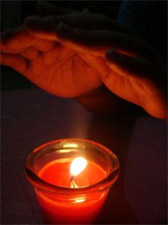Introduction
Welcome to the Aware Medicine Web site for the University of Wisconsin School of Medicine and Public Health, Department of Family Medicine and Community Health. This site was made possible in part by a grant from the George Washington Institute for Spirituality and Health (GWish).
 This site is designed to be useful to anyone, but its focus is those in the health professions, particularly healers in training (e.g., students and residents). Training as a healer is, among other things, a rite of passage. It can be grueling. It can be enlightening. It can be profound, and it can be terrifying. You see people at their worst, and you see them at their best.
This site is designed to be useful to anyone, but its focus is those in the health professions, particularly healers in training (e.g., students and residents). Training as a healer is, among other things, a rite of passage. It can be grueling. It can be enlightening. It can be profound, and it can be terrifying. You see people at their worst, and you see them at their best.
Success in healthcare requires that you have a sound knowledge base. In fact, most of the training allopathic health care providers receive involves memorizing facts and learning methods of diagnosing and treating different disorders. This is essential, but it is insufficient. The art of healing requires you go even farther. These pages are designed to help you explore what that ‘something more’ might entail for you. This site offers resources to help you become a more aware provider – aware of yourself, and aware of the people who seek your care.
Once you begin the journey toward becoming a healer, you are forever changed. You never stop learning. Every person you see – everyone who asks for your help – is also your teacher.
Defining “Aware Medicine”
Aware Medicine encompasses self-awareness, awareness of others, and methods (such as mindfulness) that help to cultivate that awareness. Aware Medicine:
- Draws from many different ‘ways of knowing.’ Medical training is grounded in the scientific method and deductive reasoning, but there are other ways to gain understanding. Narratives, intuition, culture, the arts, and many other sources also define what people know and where they seek healthcare. Epistemology – how we come to know what we know – is an important consideration.
- Acknowledges the principle of “gnothi seauthon” (knowing oneself). To heal others, you must first honor the need for self-awareness and self-healing.
- Recognizes the uniqueness of each individual we are asked to heal, considering them in the context of their family lives, their personal experiences, their cultural and spiritual backgrounds, and their physical environments. Aware medicine respects that people have different perspectives surrounding the causes and cures for suffering.
- Draws insights from mindfulness practice. Mindfulness, at its core, is about paying attention. It is about attuning your awareness and closely examining your thought patterns. Research indicates that mindfulness training can help with many medical conditions. It can have a positive influence on brain function, immune response, and one’s ability to handle life’s challenges. It has been used in Western hospital settings for over thirty years, and it has been practiced as part of different spiritual and philosophical traditions worldwide for millennia.
- Accounts for the role spirituality plays in healing. Many people flinch at the mention of the “S-word.” This is understandable, given the conflicts that may arise when it is discussed. The intent here is NOT to promote a specific belief system or agenda. You are simply encouraged to explore your path, and this site offers suggestions for how you might do so. Where your path takes you is entirely up to you. Spirituality, for the purposes of this website, can be broadly defined as “…the way you find meaning, hope, comfort, and inner peace in your life.” (familydoctor.org). Each person’s way of meeting these fundamental needs will be unique.
Site Outline
This site has 4 main sections.
1. Aware Medicine Curriculum. This is the starting point for University of Wisconsin family medicine residents or other learners participating in the Aware Medicine curriculum. Here you will find lists of course objectives and instructions for completing various assignments.
2. Self Awareness & Self Care. This section provides tools for evaluating your current state of health. It offers self-care resources, including guidance for writing your own Integrative Health plan.
3. Awareness of Others. Here you will find links and other resources to help you provide better care for people with different backgrounds. Cultural sensitivity and key elements of different belief systems are explored. Case histories, written by University of Wisconsin family medicine residents and faculty, addressing the challenges that arise in meeting the needs of patients from different backgrounds, are archived here. This section also includes guidelines for taking spiritual histories, optimizing communication with others, and making care as compassionate as possible.
4. Mindfulness & Meditation. While mindfulness is a recurring theme throughout this Web site, this section offers additional information on what mindfulness and meditation are. It explores why meditation can be useful and offers links to research data on meditation. Guidelines on how and where to meditate are also provided. Mindfulness exercises specifically for healthcare practitioners are offered, as are links that can help you learn more about contemplative traditions from around the world.

Every human has four endowments – self awareness, conscience, independent will and creative imagination. These give us the ultimate human freedom…The power to choose, to respond, to change.
-Stephen R. Covey
Diseases of the soul are more dangerous and more numerous than those of the body.
-Cicero
What really matters?
-Katherine Bonus

Why The Candles?
Candles are used symbolically in spiritual traditions worldwide. Like understanding, candlelight can be transferred without the one who imparts it losing anything. Candles serve as signals. They can light the way. They help us search in the dark. Their light can take away the hard edges of what they illuminate. They provide warmth.
Candles can also burn us if we don’t respect them. They can be “burnt at both ends.” Candles can tempt moths to their death, and they can start a conflagration.
This Web site is like a candle proffered to you. It is up to you to decide how you will use it. If it is enlightening even in the tiniest of ways, it has served its purpose.
My candle burns at both ends;
It will not last the night;
But ah, my foes, and oh, my friends
It gives a lovely light.
-Edna St Vincent Millay
Out, out, brief candle!
Life’s but a walking shadow, a poor player
That struts and frets his hour upon the stage
And then is heard no more. It is a tale
Told by an idiot, full of sound and fury,
Signifying nothing.
-Shakespeare, Macbeth

